THE ORIENTATION IN THE TURKISH FOREIGN POLICY: NEO-OTTOMANISM OR EURASIANISM?
6 March, 2021,Necati Demircan
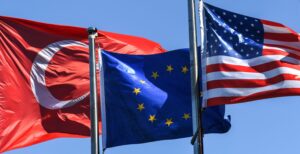
Over the past few years, there has been an important change in Turkish foreign policy. Since 1946, the orientation of Turkish foreign policy had been centered on the west. Turkey's developing relations with the Western bloc, which began with the Truman Doctrine and the Marshall Plan, made it part of the Atlantic camp with its membership in NATO in 1952. This process has even been described as the way to become Little America. Although Turkey experienced crises in various periods, such as the Jupiter Missile Crisis, the Johnson Letter crisis, the 1974 Cyprus crisis, and the Invasion of Iraq, it had not changed its foreign policy position, which is generally centered on NATO. But over the past few years, Turkey’s ups and downs tension with the US and NATO has caused to question the Western alliance. As a result, this significant change causes researchers to analyze where to evolving orientation. Western-centered researchers put forward arguments that the orientation in Turkish foreign policy is Neo-Ottomanist. We will focus on the discussion about where is the orientation of Turkish foreign policy.
First of all, the theses claiming to be a Neo-Ottomanist orientation are mainly imposed from the West. It introduced as the return of Turkey to the territory under the rule of the Ottoman Empire. But there is no serious broad discussion about Neo-Ottomans in Turkish domestic politics. In general, those who conducted this debate claim that Turkey has taken an expansionist and conflict-escalating stance by addressing its growing influence in the region. In addition, this discussion is continued by Turkish studies that adopt West centrism.
How did Neo Ottomanism and Pan-Islamism emerge?
The idea of Ottomanism, born during the reign of Mahmud II (1808-39), was the idea of uniting all communities under the Ottomanism thought, regardless of religion and nationality. After the failure of the policy of creating the Ottoman Nation due to the multi-national nature of the state, the idea of creating pan-Islamic unity among Muslim communities living within the borders of the Ottoman state gained strength. Although the pan-Islamist (i.e. Islamic Union) policy started to be spoken in the last period of the Abdulaziz period (1861-76), it was tried to be implemented in practice during period of the Abdulhamit II (1876-1909). However, the independence of the Christian nationalities in the Balkans at the end of the 20th century caused the Ottomanism idea to collapse. Then, the separation of Albania and Macedonia, which were the Muslim majority, from the Ottoman Empire, and the revolt of the Arabs against the Ottoman Empire in the First World War proved that pan-Islamist policies were not valid. The idea of establishing a nation-state based on Turkishness gained strength in the Ottoman Empire, which collapsed at the end of the First World War. Turkist ideologists Ziya Gökalp emphasized in his book Türkleşmek, İslamlaşmak ve Muassırlaşmak (Turkification, Islamization, and Modernization), that it is not a coincidence that the idea of a nation in the Ottoman Empire emerged first in the Balkans then among the Arabs, and in the last Turks. Because he considered it as an effort to keep the state alive since the founders of the Ottoman Empire were Turkish. The concept of the Turkish nation was adopted as the philosophy of the Turkish Republic that founded on October 29, 1923. Mustafa Kemal Atatürk described the Turkish nation as follows in his book of Civil Information issued to be taught in schools. ‘The people of Turkey who founded the Republic of Turkey are calls the Turkish nation.'[1]In short, the Turkish nation emerged as a fictional, emotional, and will-to-live phenomenon with a historicity that does not sit on a racial origin.
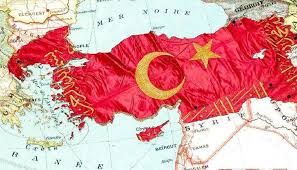
Neo-Ottomanism
The term ”Neo-Ottomanism" first became fashionable in academic and non-academic discourse in the early 1990s and then in the 2000s. First, after the end of the Cold War, President Turgut Ozal's initiatives in the Balkans and Central Asia were mentioned to as neo-Ottomanism. Then, after the AKP came to power in 2002, the rhetoric of neo-Ottomanism became fashionable again. In particular, Ahmet Davutoğlu, academician and foreign minister, was accepted as the architect of the second wave. Some Western scholars have interpreted neo-Ottomanism as Turkey's return to the Middle East. Graham Fuller of Rand Corporation, one of the early proponents of the idea in academia, defined neo-Ottomanism in 1992 as “a renewed interest in the former territories and people of the Empire, which includes Muslims who were part of that Empire,” that arose due to the disappearance of Cold War conditions and that helped Turks “to see themselves once again at the center of a world reemerging around them on all sides rather than at the tail-end of a European world”[2]
Ahmet Davutoglu, in his book Strategic Depht (Turkish: Stratejik Derinlik), did not clearly mention Pan-Islamists and Neo-Ottomanism, but stated their foundations. According to Davutoglu, the historical past or historical identity has an effect on the strategic mentality of countries. In solving regional problems, the historical heritage and identity of the Ottoman Empire to the Republic of Turkey should be established as a strategy on foreign policy. Davutoglu believes that the historical identity of the Ottoman Empire clashed with the Republic of Turkey.[3]In addition, under Davutoglu's pan-Islamist and Neo-Ottoman theses lies expansionism. But Turkey, acting with an understanding of expansionism, will easily become the target of the West and will have to fight the danger of being destroyed. Davutoğlu was in an effort to legitimize this mentality with the examples of Kazım Karabekir's Erzurum-Kars-Ardahan and Mustafa Kemal's Hatay. Davutoglu's views are a tiny version of Abdulhamid's Pan-Islamist policy. Also, Davutoglu has rivalries with Russia in his book. Among its goals, he considers the infrastructure of the idea of unification with Azerbaijan, Kazakhstan, Turkmenistan and Uzbekistan as an element of balancing factor against Russia. He thinks Russia's relationship with Iran, its dominance in the Caucasus, and its goal set to be an obstacle to the revival of the Soviets.[4]According to Davutoglu, Turkey was to dominate its hinterland – the Middle East, the Balkans and the Caucasus– and thereby create a new Lebensraum (he uses the Turkish words ‘hayat alani’, which is a direct translation of the German Lebensraum, or ‘living space’). He began to turn his pan-Islamist vision into reality after 2002, following his appointment as foreign-policy adviser to the ruling Justice and Development Party (AKP), a position he held until he was made foreign minister in 2009.[5]Especially, policymakers, Ozal, or Erdogan have never officially used the term neo-Ottomanism.
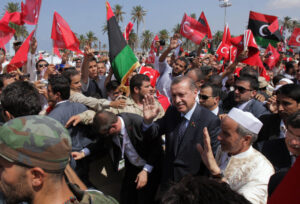
Turkish Prime Minister Recep Tayyip Erdogan and Libya's interim leader Mustafa Abdel Jalil in Tripoli
Neo-Ottomanism is Based On American-Center
All political figures that advocated Neo-Ottomanism and tried to implement them in practice served directly or indirectly in accordance with Western and US policies. The former prime minister and President (1983-1993) Turgut Ozal, who ideologically brought neo-liberalism intoTurkeyas close to the West, was the first step toward Neo-Ottomanism policy. While other Rand Corporation publications (see for example Fuller, Lesser, Henze & Brown, 1993) stressed this idea on the international academic/think tank scene, in Turkey Cengiz Çandar, a journalist and adviser to Turgut Özal is usually credited with coining the term neo-Ottomanism and acting as an early proponent of a foreign policy based on the concept. Not surprisingly, Çandar and Fuller eventually penned an article together in 2001, titled “Grand Geopolitics for a New Turkey,” full of references praising the Ottoman Empire and underscoring how Turkey should make use of this imperial grandeur.[6]Thus, Neo-Ottomanism was secretly supported by the US. For example, the clearest proof of this is FETÖ. The support of the US to the FETO movement provided ideological support in moderate Islam and Neo-Ottomanism. If we focus on the key figures who interpret neo-Ottomanist or pan-Islamist, the key point between Cengiz Candar, Graham Fuller, and Ahmet Davutoğlu should be questioned about the deep strong bond in US relations and FETO relations. For example, Graham Fuller and the CIA played an important role in grant residence permit for Fethullah Gulen in the US. In addition, the western relationship stands out when Cengiz Çandar evaluating the level of relationship between FETO and the US that has lasted since the 90s. At the same time, the end of Ahmet Davutoğlu's prime ministry was interpreted as America Loses Its Man in Ankara.[7]If Turkey had followed a Neo-Ottoman political orientation, it should have been in conflict with powers such as Iran and Russia in the region. According to Neo-Ottomanists, Russia and Iran were the countries where Turkey had to fight for power in the region. But the objective situation shows the opposite. Turkey, Iran, and Russia continued to develop trilateral cooperation in Astana format aimed at resolving the Syrian crisis since 2016. Developing relations continued solving regional problems in Nagorno-Karabakh. Turkey's acquisition of the S400 air defense system from Russia led to cooperation in the defense industry.
Neo-Otttomanist Argues Lost in Turkey
With the July 15, 2016, military coup attempt Turkey has taken a stand against the United States and the West. At the same time, representatives of the Neo-Ottomanist were purged from the Justice and Development Party (Turkish: Adalet ve Kalkınma Partisi AKP). But what happened to the AKP that was ideologically close to Neo-Ottomanism? At the center of the neo-Ottomanist theses within the AKP was the ideological obsession of people with FETO affiliations, as well as names such as Ahmet Davutoğlu and Abdullah Gül. The conflicts were created to establish dominance in countries such as Egypt, Syria, and Libya. It also turned into a conflicting relationship with Russia and Iran in the region. These conflicts caused a diplomatic impasse as well as Turkey's isolation in the region. The dismissing Ahmet Davutoğlu and FETÖ members from the state institutions and diplomacy resulted in the purging neo-Ottomanist policy.
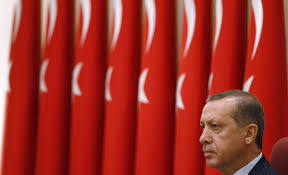
Emerging New Trend: Eurasianism
Eurasianism or the orientation towards Eurasia is rising as a new trend in Turkey. This trend emerged in the late 90s and early 2000s with various initiatives to developing cooperation with Eurasian countries. But Eurasianism did not gain serious stability due to the harmonization of Turkey's policymakers with the US, and Turkey's position in the NATO alliance. Political figures that tried to implement policies incompatible with the West were overthrow from power in various ways. For example, in 2001, the Democratic Left Party (Turkish: Demokratik Sol Parti DSP) government, which changed its policy of joining the EU, opposed the US invasion of Iraq, and turned to Eurasia, was overthrown from power by creating an economic crisis. The officers, journalists, lawyers, and academics who supporting the nationalist and Eurasian orientation dismissed by the FETO with Conspire of Ergenekon and Operation Sledgehammer (Turkish: Balyoz Operasyonu).
It has made a serious orientation towards Eurasia as a solution to Turkey's disputes with the West over Syria, Eastern Mediterranean issues, and the separatist PKK terror. In this case, the West's stance on Erdogan was most effective during the July 15 military coup attempt. Then the west continued to define Erdogan as the autocratic leader at every opportunity, and Erdogan was placed on the target board with the other Asian leader.[8](Foreign Policy Cover page: Erdogan, Putin, Xi Jinping, Orban, Duterte) Thus, Turkey severing relations ties with the West while improved its relations with Eurasia. However, July 15 is not a case in itself in Turkish foreign policy. Because the weakening US hegemony in the global order and rising Eurasia on the China and Russia have a big role. The end of the American age in the 21st century caused to the opening of the Eurasian age. In this case, the COVID19 epidemic and the US Capitol raid after the American elections clearly showed American weaknesses. This situation provided the rightful basis for the shift to Eurasia. At the same time, the trio of Turkey, Russia, and Iran increased their influence in the region which developed in the Astana format caused the United States to reduce its influence in the region.
If Turkey had followed a Neo-Ottoman political orientation Turkey should had been in conflict with powers such as Iran and Russia in the region. Because according to Neo-Ottomanists, Russia and Iran who Turkey had to power struggle for in the region. But the objective situation shows the opposite. Turkey, along with Iran and Russia, continued to develop trilateral cooperation in Astana format aimed at resolving the Syrian crisis in 2016. The developing relations continued resolution of regional problems such as Nagorno-Karabakh. Turkey's purchase of the S400 air defense system from Russia caused to cooperation on the defense industry.
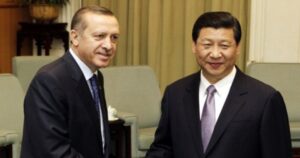
Conclusion
As a result, after Turkey's purchase of the S400 air defense system, there were sanctions by the United States on the production of F35 fighter jets. This may also raise Turkey's new cooperation with Eurasian countries in the field of Defense. In addition, the Turkish-Russian joint military center established in Nagorno-Karabakh after joint Turkey-Russia patrols in Syria. Also, this situation may play a positive role in embracing Turkey and Eurasia. At the same time, Turkey's efforts to strengthen the role of One Belt One Road are part of a road in the middle corridor. Especially over the past few months, Export trains from Turkey to China and Asia Anew Initiative can also be added here. Turkey's attempt to play a Neo-Ottomanist political role in Eurasia means a conflict of interests in the region with the Russia-Iran-China trio. The idea that Turkey pursuing a Neo-Ottomanist policy is at odds with practice while there are conflicts in the Atlantic camp and strengthening its relations with Eurasia. Even considering that the political center of the world has shifted to Asia and Eurasia, it is far from reality that Turkey will take a neo-Ottomanist political position in the future. In short, neo-Ottomanism is only imagined by the west to create a perception that Turkey is expansionist.
Note
FETÖ:The Fetullah Terrorist Organization is an organization that tries to create a secret parallel structure within the state under the leadership of Fetullah Gülen. The leader of the organization has lived in the U.S. state of Pennsylvania since 1999. Fetullah Gülen took part in the Association of Erzurum fighting communism (Turkish: Komünizmle Mücadele Derneği) in 1962-63 and worked actively. They carried out secret organization in the police, military, and bureaucracy levels of the state from the 1980s until 2016. On July 15, 2016, FETO soldiers within the army attempted a coup against the government. Former CIA official George Fidas, CIA Middle East Chief Graham Fuller, and former US ambassador to Ankara Morton Abromowitz were instrumental in providing the residence permit of FETÖ leader Fetullah Gülen in the USA. In addition, the organization has provided intelligence support to the CIA by opening more than 2,000 schools in 160 countries and conducting business activities. FETÖ, which advocated the moderate Islamic ideology, has been supported by Western powers since the 1960s. The organization receives more than $ 500 million in income from its operations in the USA.[9]
[1]Afet İnan, Medeni Bilgiler Kitabı Mustafa Kemal Atatürk'ün El Yazıları, Türk Tarih Kurumu Basımevi, 1969, p.18
[2]Lerna K. Yanık, Constructing Turkish “exceptionalism”: Discourses of liminality and hybridity in post-Cold War Turkish foreign policy, Political Geography, Political Geography 30 (2011) 80-89
[3]Ahmet Davutoğlu, ‘Stratejik Derinlik’, Küre Yayınları, 50th Press, p.45
[4]Ahmet Davutoğlu, ‘Stratejik Derinlik’, Küre Yayınları, 50th Press, p.195
[5]Behlül Ozkan (2014) Turkey, Davutoglu and the Idea of Pan-Islamism, Survival: Global Politics and Strategy, 56:4, 119-140, DOI: 10.1080/00396338.2014.941570
[6]Lerna K. Yanık, Constructing Turkish “exceptionalism”: Discourses of liminality and hybridity in post-Cold War Turkish foreign policy, Political Geography, Political Geography 30 (2011) 84
[7]Foreign Policy, America Loses Its man in Ankara,https://foreignpolicy.com/2016/05/05/america-loses-its-man-in-ankara/
[8]Foreign Policy, Autocracy Now, Volume 98, Number 5, September/October 2019
[9]Polis Akademisi II. Uluslararası Güvenlik Sempozyumu Raporu, Uluslararası Tehdit Olarak FETÖ, Polis Akademisi Yayınları, Rapor No 20, Aralık 2018, Ankara Also see; Milli İstihbarat Teşkilatı Müsteşarlığı (National Intelligence Organization), ‘Fetullah Gülen, CIA Bağlantıları’, 3 Nisan 1991, No: 4104000/8009-54206
https://quixoteglobe.com/turkish-foreign-policy-neo-ottomanism-or-eurasianism-2021/
